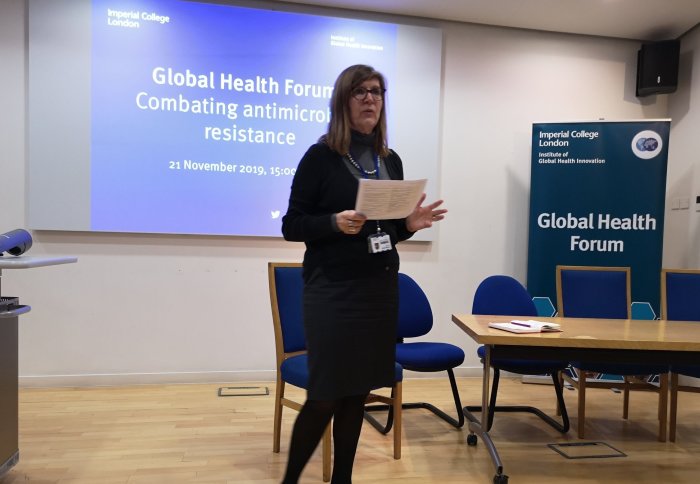How well are we tackling antimicrobial resistance?

Last week’s IGHI Global Health Forum showcased Imperial’s latest developments in antimicrobial resistance solutions.
Imperial is home to a host of academics conducting research on one of the biggest health threats of the 21st century, antimicrobial resistance (AMR). In IGHI’s latest Forum, six experts presented their research on AMR and infection control.
Facing the challenge of antimicrobial resistance
Professor Alison Holmes, Lead for Imperial’s Antimicrobial Research Collective and chair of the event opened the Forum by setting the scene on the current state of AMR. Around 700,000 people lose their life each year due to drug-resistant diseases (WHO). AMR happens when microorganisms stop an antimicrobial such as antibiotics from working.
She explained that future AMR research needed to focus on “how we can be using existing drugs better” rather than creating new ones. AMR means many medicines are becoming less effective, making it difficult to treat specific diseases or infections. Yet the development of new antimicrobials has seen slow progress, which means resources are better focused on improving current drugs.
This includes making sure that antibiotics are prescribed appropriately. But as Clinical Researcher Dr Damien Ming explained, health professionals face many challenges when prescribing drugs to patients. Clinicians must deal with missing information from patient records which can lead to uninformed decisions in treatment. Delays in waiting for a diagnostic test results can also affect prescribing choices. Clinicians must, therefore, weigh up the risks and competing factors to determine whether it is necessary to prescribe a person an antimicrobial drug.
How does antimicrobial resistance occur?
The AMR crisis is happening for a number of reasons. Dr Jon Otter, Manager of Infection Prevention and Control at Imperial College Healthcare NHS Trust highlighted the critical role of the environment: “When antibiotics get into the environment, they enter the microbial warzone...They provide a selective pressure for resistant bacteria already in the environment, which eventually find their way back into human and veterinary medicine.” The use of antibiotics in agriculture contributes to AMR being a widespread problem.
For Dr Otter, tackling AMR by focusing on diagnosis and treatment is not enough. He advocated a “one-health” approach as the roots of AMR are so diverse: “We need to take a wider view of the problem – a one health approach encompassing interventions in acute healthcare, the animal kingdom and the community.”
Turning to technology for solutions
For a long time, solutions to combat AMR have focused on improving education for those who prescribe medication. While this is important, Dr Enrique Castro-Sanchez, an Academic Research Nurse stated that there are limitations to this, highlighting that more education doesn’t necessarily mean people feel equipped to deal with uncertainty in prescribing.
“Engagement with any solution decays with time,” stated Dr Castro-Sanchez, explaining that education can only go so far to capture the interest of healthcare professionals.
As a result, he’s turned to technology-based solutions. Dr Castro-Sanchez presented the game he’s developed for smartphones called ‘On Call: Antibiotics’. The educational game, aimed at and co-produced with clinicians, challenges the user to select the most appropriate antimicrobial treatment. They must make difficult decisions while facing competing influences from patients, pharmacists, and nurses.
Although a simple solution, Dr Castro-Sanchez told the Forum that a game appeals to our competitiveness, keeping users hooked to the platform so that such decisions stay at the forefront of their minds.
Senior Lead Research Pharmacist, Dr Esmita Charani’s work also focuses on the behavioural choices made by healthcare professionals. She suggested that despite receiving guidelines on how to prescribe antimicrobial drugs, surgical specialists specifically had neglected these interventions. Her work also found that there was a lack of research in understanding physicians’ decision-making process physicians when prescribing medication.
“We’re still not getting antibiotic prescribing right in hospitals,” she said. Dr Charani’s research found that there were numerous ‘unwritten rules’ that influence the prescribing behaviours of physicians. This includes an accepted non-compliance to guidelines by senior physicians and a reluctance to change these behaviours to respect the hierarchy of staff.
Dr Charani is now using the findings of her research to develop interventions for improving prescribing behaviours, specifically for surgical specialists.
The search for new diagnostics
Lecturer in AMR at Imperial, Dr Jesus Rodriguez Manzano explained the need for a new diagnostic solution to new superbugs called CPE (Carbapenemase Producing Enterobacteriaceae), which are resistant to nearly all antibiotics. Dr Manzano has developed a method to increase the capabilities of existing diagnostic tests, which they will soon evaluate in a clinical validation study.
Final speaker Dr Pantelis Georgiou, from the Department of Electrical and Electronic Engineering, is also working on improving diagnostics. He displayed the potential of using artificial intelligence in tackling AMR.
Dr Georgiou and his team have developed a clinical decision-support system for a tablet device called EPIC IMPOC. Using a microchip which can detect bacteria, the system links to patient records and then guides clinicians’ prescribing.
Solutions such as this system could help save time in decision-making, ensure patients get the right drugs, while also reducing costs.
Join the conversation
This summarises just one of the many Global Health Forums that IGHI runs every month, on a range of interesting and present global health topics. To see a selection of the talks, watch the YouTube video below.
If you’d like to hear more about research like this, sign up to our mailing list to receive more information about our monthly Global Health Forums.
Article text (excluding photos or graphics) © Imperial College London.
Photos and graphics subject to third party copyright used with permission or © Imperial College London.
Reporter
Nikita Rathod
Communications Division